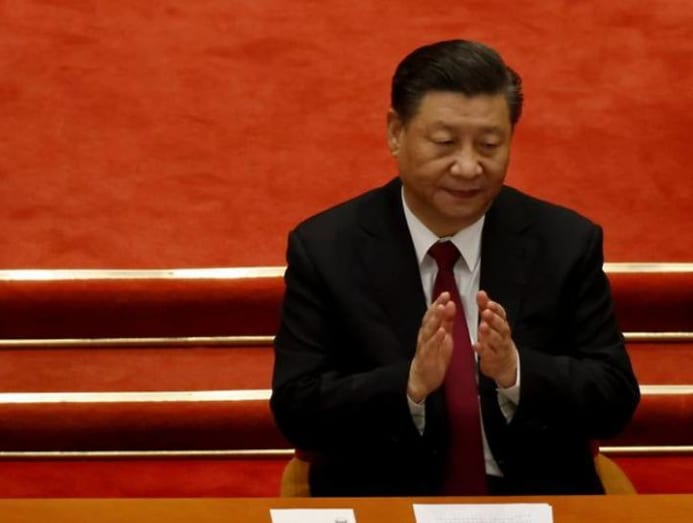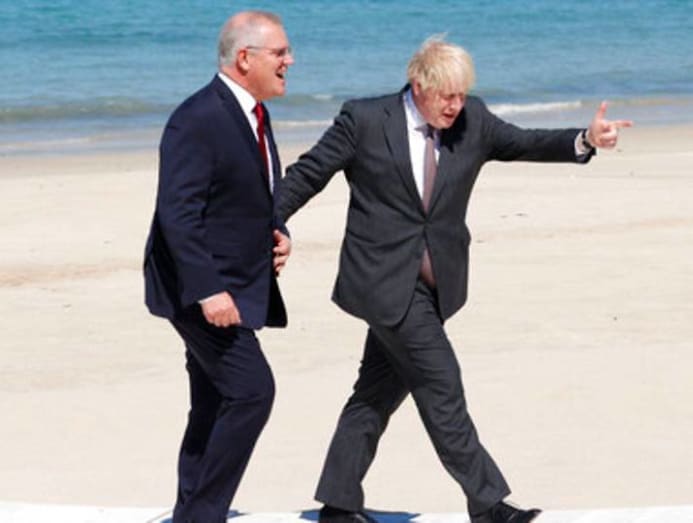Commentary: G7 summit proved the world has shifted after Trump
MELBOURNE: What a divergence a year makes in international diplomacy.
A year ago, then-US President Donald Trump was obliged to abandon his plans for a G7 peak at the presidential retreat of Camp David outside Washington.
Various excuses were advanced by participants, including the inadvisability of travelling across the globe in the midst of a pandemic. But in reality few, if whatever, G7 leaders wanted to associate themselves with Trump in what was hoped would exist the last days of an ill-starred presidency.
A twelvemonth later on, these same leaders gathered at an English littoral retreat – in the shadow of a persistent COVID-19 pandemic – to celebrate the end of a disruptive chapter in diplomatic history.
READ: Commentary: G7 meeting can exist a turning point in pandemic recovery
Relief was palpable in the interactions of representatives of the United states, United kingdom, France, Germany, Japan, Italia and Canada.
America was back, not in its "America First" guise, merely every bit the proclaimed leader of the free earth, to utilise an old-fashioned description.
Yet, in the four years of the Trump presidency, during which Washington effectively abandoned its global leadership role in favour of an inward-looking posture divers past its embrace of an America Starting time doctrine, the globe had changed, and shifted dramatically.
In 2016, the final yr of the Obama administration, the G7 summit in Nihon focused on the issue of climate in the wake of the Paris Agreement signed in April of that year. Its other priorities were disputes in the South People's republic of china Sea and, interestingly enough, the demand to strengthen a global response to pandemics in light of experiences with the Ebola virus in Africa.
That global response has been plant to be inadequate. This prompts the question: What discover did global health authorities, principally the World Health Organization, take of the G7'south 2022 communique?
READ: Commentary: Joe Biden is reshaping America and the earth in his paradigm
READ: Commentary: To everyone's relief, US is back in the commuter'south seat on climate change
People's republic of china, THE Master G7 Business organization
Five years later on, the challenges identified in the 2022 document take been vastly magnified. This has been brought about by a combination of lack of U.s. leadership on issues such as climate, and a broader global failure to manage Communist china'south rise.

In 2016, China's activities in the South China Sea in disobedience of the Un Convention on the Constabulary of the Bounding main (UNCLOS) were a growing business organization, as were signs of its increasing assertiveness under its nationalist leader, Xi Jinping.
But the consensus view so was that China'due south rise could be accommodated without undue disruption to a rules-based international social club. That has proved a significant miscalculation.
Fast-forward to the 2022 G7 in Cornwall, where concerns near Cathay's rise in its various dimensions stalked the round-table discussions and bilateral meetings. No other issue came close to matching worries nearly China: Not climate change, nor the ongoing challenges of the pandemic.
In the end, the G7 communique was relatively restrained on Red china. This reflected differences of opinion among participants nearly how to manage a difficult situation.
The US and Canadians would accept liked stronger language. The Europeans favoured a less hawkish arroyo. Japan was somewhere in the middle.
READ: Commentary: Some soul-searching needed in China's fresh push to brand friends and influence people
READ: Commentary: What's actually backside fresh calls for investigations into COVID-nineteen origins
POINTED REFERENCES TO CHINA
References to China were still pointed, in dissimilarity to previous G7 communiques, which have danced effectually the outcome of Beijing's challenges to a rules-based global order.

On human being rights, the G7 was commendably forthright:
Nosotros will promote our values by calling on China to respect homo rights and key freedoms, especially in relation to Xinjiang and those rights, freedoms and high degree of autonomy for Hong Kong enshrined in the Sino-British articulation declaration and the Basic Police force.
Significantly, Taiwan made its way into a G7 communique for the first fourth dimension. Here, the world's leading democracies issued a fairly blunt warning to Beijing not to further destabilise relations across the Taiwan Strait:
We underscore the importance of peace and stability across the Taiwan Strait, and encourage the peaceful resolution of cross-Strait bug. We remain seriously concerned nigh the situation in the East and South China Seas and strongly oppose any unilateral endeavour to alter the status quo and increment tensions.
Predictably, Chinese commentators dismissed the G7 process equally a sideshow, challenge "the world's economic and political eye of gravity had shifted", as the Global Times put it.
READ: Commentary: They already have jet bombers and super missiles. Will Chinese fighter jets be more powerful than America'south soon?
READ: Commentary: How Mainland china will attempt to subdue Taiwan – without firing a bullet
Awkward POSITION FOR MORRISON
Morrison, equally an official guest, will accept been relieved the G7 did not reach a consensus on the timing for a phase-out of coal for generating electrical power.
On the other manus, he will not have disregarded strong linguistic communication in the communique calling for a commitment to accomplish net null greenhouse gas emissions "as before long equally possible".
Commonwealth of australia volition have had no issue with other G7 initiatives such as calls for a global minimum tax to ensure greater global equity. Nor will it object to a proposal for liberal democracies to contribute to an infrastructure fund to compete with China's Belt and Road Initiative in the developing world.
Morrison volition no doubt have been disappointed he did not have a "1-on-one" meeting with US President Joe Biden. Instead, he had to make do with a three-way conversation involving the pinnacle's host, U.k. Prime Minister Boris Johnson.
Information technology is non clear whether this was a snub, just those briefing journalists in accelerate of the G7 should not have raised expectations.

In one respect, Morrison volition accept constitute the Cornwall G7 awkward. No other leader of a Western liberal democracy had aligned themselves as closely with the Trump White House.
In his attempts to position himself alongside Trump, Morrison echoed the then The states president's antagonism towards international institutions, broadly summed upwards past the Morrison's reference to "negative globalism" in a Lowy Institute oral communication in 2019.
These were sentiments the former The states president used to promote his version of an America First policy, in contrast to the multilateralist tendencies of his predecessors.
READ: Commentary: Nosotros need to talk about how Donald Trump'southward presidency wasn't a complete disaster
READ: Commentary: Why Biden volition observe information technology difficult to disengage Trump'southward 'America First' trade policy
Morrison's adoption of this Trumpism, now quietly discarded in his public statements, sits uncomfortably with the new president's accent on Washington's global leadership in partnership with similar-minded countries and institutions.
Pointedly, the G7 communique reiterated liberal democracies' commitment to "multilateralism".
If nothing else, Commonwealth of australia's prime number minister should have concluded in Cornwall that his own personal investment in a Trump presidency was not the well-nigh prudent course. The world has shifted.
Tony Walker is Vice-Chancellor's Fellow at La Trobe Academy. This commentary offset appeared on The Conversation.
boatwrightanse1943.blogspot.com
Source: https://cnalifestyle.channelnewsasia.com/commentary/commentary-g7-summit-proved-world-has-shifted-after-trump-297441
0 Response to "Commentary: G7 summit proved the world has shifted after Trump"
Post a Comment